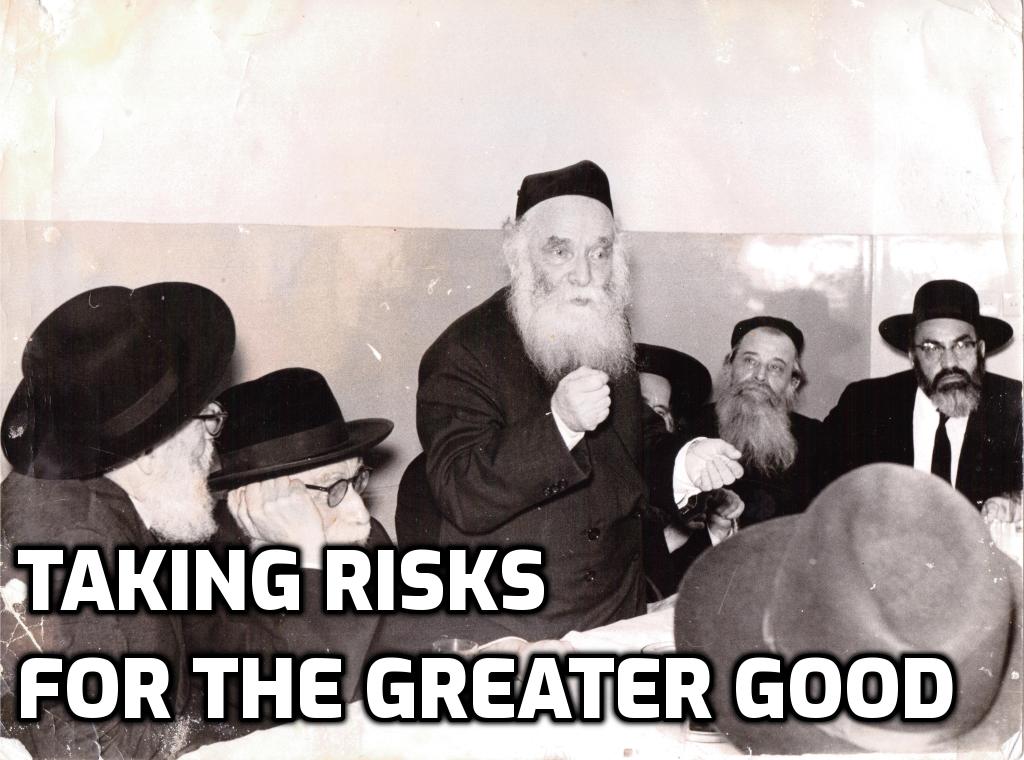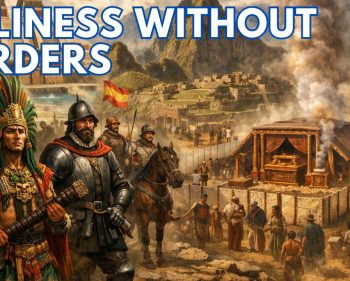TAKING RISKS FOR THE GREATER GOOD

The end of Bamidbar is a moment filled with anticipation. After decades of wandering through wilderness and heartbreak, the Jewish people are finally standing at the threshold of the Promised Land.
But this is not the same bedraggled group that staggered out of Egypt yearning for cucumbers and complaining about the menu. This is a new generation, hardened by experience, forged in the crucible of the desert. And ready to rise to the moment. Or so we thought.
Just as the Land of Israel comes into sight — there’s an unexpected curveball. Two tribes, Reuven and Gad, step forward with a request that lands on Moshe’s ears like a thunderclap. “This land on the east side of the Jordan is good for cattle,” they say. “We have cattle. Let us stay here.”
What? Stay here? After all this? After forty years of anticipation, struggle, loss, and hope — now, with Eretz Yisrael finally within reach, literally within sight — they want to stay here so they can graze their cattle?
Moshe’s reaction is immediate and it’s visceral. He’s not just disappointed — he’s absolutely appalled. He sees history repeating itself in the worst possible way. He remembers all too vividly how the previous generation lost their right to enter the Land because of the spies downplaying the value of Eretz Yisrael. “Let’s stay here,” they say to the Jewish people. And now, once again, the same thing is happening.
Moshe’s reply is searing (Num. 32:6-7): הַאַחֵיכֶם יָבֹאוּ לַמִּלְחָמָה, וְאַתֶּם תֵּשְׁבוּ פֹה? וְלָמָּה תְנִיאוּן אֶת לֵב בְּנֵי־יִשְׂרָאֵל, מֵעֲבֹר אֶל־הָאָרֶץ אֲשֶׁר נָתַן ה׳ לָהֶם — “Shall your brothers go out to war, while you sit here? And why do you discourage the hearts of the Children of Israel from crossing into the land that the Lord has given them?”
Let’s be clear: the request isn’t treasonous. It’s not even unreasonable. The tribes of Reuven and Gad are being practical. The land east of the Jordan is fertile, ideal for livestock. Why not settle where it makes economic sense?
But that’s precisely the problem. They’re not thinking like a nation — they’re thinking like self-interested cattle ranchers. And that, says Moshe, is the root of so many failures throughout history: when we prioritize our convenience and expedience over our broader mission, our prosperity over our true purpose, and our sheep and cows over our larger calling.
Moshe warns Reuven and Gad — in no uncertain terms — that their behavior mirrors the sin of the spies, whose disparagement of the Land led to forty years of wandering. And though Reuven and Gad eventually negotiate a compromise — agreeing to fight alongside their brethren before returning to east of the Jordan — the damage is done.
History, as it turns out, vindicated Moshe’s instinct. The tribes of Reuven and Gad, isolated across the Jordan, become spiritually and militarily vulnerable.
They are the first to be exiled when foreign powers invade (see: I Chron. 5:26). They never produce any national leaders, nor do they play a significant role in the great spiritual journey of Jewish destiny. They traded centrality for comfort — and ended up with neither.
The prophetess Devorah, in her memorable poem of war and courage, calls out the tribe of Reuven for their indifference to the national fate (Jud. 5:16): לָמָּה יָשַׁבְתָּ בֵּין הַמִּשְׁפְּתַיִם לִשְׁמֹעַ שְׁרִקוֹת עֲדָרִים לִפְלַגּוֹת רְאוּבֵן גְּדוֹלִים חִקְרֵי לֵב — “Why did you sit among the sheep, to hear the bleating of the flocks? Among the divisions of Reuven were great heart-searchings.”
In other words: you thought about it, you wrestled with it — but in the end, you stayed with the sheep. You chose ease over engagement, and that failure echoes through time.
Fast forward to Shushan. Mordechai confronts Esther with the same age-old dilemma: Will you risk your comfort to save your people? Or will you wait it out in your palace and hope someone else steps up?
His warning is unforgettable (Est. 4:13-14): אַל תְּדַמִּי בְנַפְשֵׁךְ לְהִמָּלֵט בֵּית הַמֶּלֶךְ מִכָּל הַיְּהוּדִים. כִּי אִם־הַחֲרֵשׁ תַּחֲרִישִׁי בָּעֵת הַזֹּאת, רֶוַח וְהַצָּלָה יַעֲמֹד לַיְּהוּדִים מִמָּקוֹם אַחֵר, וְאַתְּ וּבֵית אָבִיךְ תֹּאבֵדוּ — “Do not imagine that you will escape in the king’s palace from among all the Jews. For if you remain silent at this time, relief and salvation will come to the Jews from another place — but you and your father’s house will perish.”
It’s the same test in every generation — and it’s still our test today.
We live in an age of distractions. Of careerism, comfort, self-interest, and personal branding. It’s easy — far too easy — to turn away from the difficult, messy, painful business of Jewish survival and Jewish unity. We prefer the metaphorical cattle: jobs, mortgages, reputations, and – of course – virtue signaling.
“When you need us, we’ll be right there, on the frontline…” – like Reuven and Gad. We rationalize our retreat from responsibility with well-worn excuses. We tell ourselves that someone else will handle it, or that it’s not a problem that can be solved – and definitely not by us! We’re too busy. We’re too unqualified. We’re too…whatever.
But Jerusalem, the Talmud tells us, only stands because of those who advocate for her. The Gemara says (Sanhedrin 98a): אֵין יְרוּשָׁלַיִם נִפְדֵּית אֶלָּא בִּצְדָקָה — “Jerusalem is only redeemed through righteousness.”
In other words, Jerusalem — both the city and what it represents — will only survive because of people who step up. It will only endure because of people who do the work. And it will only thrive because of people who risk their comfort to serve something bigger.
And we have our heroes who have embodied this message, with every fiber and every ounce of their being.
One such hero was Rav Aharon Kotler (1892-1962). When he arrived in America during World War II, having miraculously escaped the Holocaust, he could have focused solely on rebuilding his life. He could have gathered a few yeshiva students around him, scratched out a living – and be done with it.
Who would have objected, or thought less of him? But that wasn’t his way. He didn’t stay with the cattle.
Instead, Rav Ahron Kotler threw himself into saving Jewish lives in Europe through the Vaad Hatzalah, lobbying politicians, raising funds, organizing rescue efforts. He was relentless. While others hesitated, he charged ahead. This great scholar, an intellectual giant who couldn’t speak English, and had lost everything he’d ever had – never hesitated, and never held back.
Then, when the war ended, he saw that Jewish souls were just as endangered as Jewish lives had been. So he built. He established Torah Umesorah to spread Jewish day schools across a spiritually barren America. He helped found Chinuch Atzmai in the newly created State of Israel to support Torah education in Israel.
And of course, he created Beth Medrash Govoha in Lakewood, which began with a handful of students, and became a powerhouse of Torah that changed the face of American Jewry, and continues to be the engine of Torah in the US and across the world.
Rav Ahron Kotler didn’t ask, “Is this my job?” He certainly never asked “What’s best for me?” He asked, “What can I do?” And then he stepped forward, fearlessly and relentlessly.
We are not the first generation to face this crossroads, and we will not be the last. But let us learn from those who came before us. The Reuven-Gad mistake wasn’t about cattle. It was about choosing the easy win over the only way to ensure long-term success. Yes, it’s hard, but anything less is to lose. They failed to see the bigger picture. We can’t afford to make that same mistake.
So here we are again — on the brink of something monumental. The Jewish world is once again at a turning point. In Israel, in the diaspora, across the globe — we face threats that demand clarity, unity, and courage. And the question remains: Will we be like Reuven and Gad, calculating and cautious? Or will we be like Rav Aharon Kotler, bold enough to recognize that this — this moment, this opportunity, this challenge — was made for us?
Because in the end, history has no time for the ones who stayed with the cattle. It only remembers the ones who crossed the Jordan.

